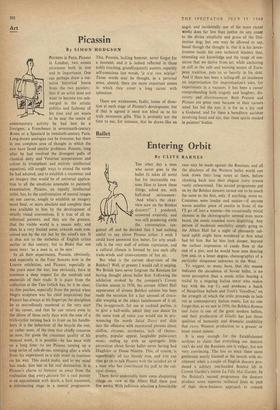B al le t
Entering Orbit
By CLIVE BARNES THE other day a man who never goes to the ballet (it takes all sorts) but for inscrutable rea- sons likes to know these things, asked me, with But what is the current okay-view of the Bolshoi? Well, at present I would call it sniping. We British have never forgiven the Russians for having thought about ballet first. Following the adulation evoked by the company's Covent Garden season in 1956, the current Albert Hall appearance of sixteen Bolshoi soloists has been made the occasion for a fair amount of croco- dile weeping at the abject tastelessness of it all. The in-approach, for use at cocktail parties, is to give a half-smile, admit they can dance (in the same tone of voice you would use in pro- nouncing the words Salad Days) and slide into the offensive with murmured phrases about chiffon, circuses, acrobatics, lack of choreo- graphy, popular appeal, laughable palm-court music, ending up with an apologetic little peroration about Soviet ballet never having had Diaghilev or Dame Ninette. This, of course, is soperficially all too bloody true, and you can then go on to talk Picasso with the satisfied air of a man who has contributed his puff to the cul- t9ral climate.
There have undeniably been some disquieting things on view at the Albert Hall these past few weeks. With judicious selection a formidable case may be made against the Russians, and all the playboys of the Western ballet world can look down their long noses at them, before climbing back into their elegant ivory towers vastly enheartened. The second programme put on by the Bolshoi dancers turned out to be much the same as the first, only, if anything, more so. Costumes were louder and nastier—if anyone waves another piece of muslin in front of me I'll go off into a trauma—the occasionally trivial element in the choreography seemed even more banal, the music sounded more dispiriting. Any person of moderate sensibility simply going to the Albert Hall for a night of pleasantly cul- tural uplift might have wondered at first what had hit him. But let him look deeper, beyond the surface impression of candy floss at the end of a pier, and he would have seen dancing (yes and, to a lesser degree, choreography) of a particular eloquence unknown in the West.
To suggest, as many have, that this season indicates the decadence of Soviet ballet, is no more perceptive than a music critic hearing a recital by a reigning Italian tenor who makes hay with the top Cs and produces a batch of Neapolitan ballads and Tosti's 'Goodbye,' on the strength of which the critic proceeds to lash out at contemporary Italian music. Let no one forget that, as we saw in 1956, the Bolshoi Romeo and Juliet is one of the great modern ballets, and their production of Giselle has just those qualities of humanity and dramatic credibility that every Western production to a greater or lesser extent misses.
It is easy enough for the Establishment acolytes to claim that everything our dancers can't do and the Russians can is vulgar, but not very convincing. The less so since these same gentlemen nearly foamed at the mouth with ex- citement when a couple of English dancers pro- duced a solitary one-handed Bolshoi lift in Covent Garden's recent La Fille Mal GardOe. In the Bolshoi's second programme the dancers produce some supreme technical feats as part of their show-business approach to concert .'; ballet. Ballerinas hurtling magnificently through
the air like guided missiles, or dancers all but entering into orbit in a circuit of the stage, are. however. only a fraction—an exciting fraction —of the story.
Where these dancers equally excel is in less sensational things--such as the muted brilliance of Margarita Smirnova and Gleb Evdokimov in the stylish Givelle pas de deux, the abandon of Tamara Varlamova: looking like a resentful Dostoievsky heroine. in a gipsy dance from Don Quixote, or Constantin Richter's peak-capped, leather-booted burnout in a Russian Dance.
That the emphasis on these dance recitals is on dancers rather than on choreography need surprise only the most naively sophisticated. Choreography. as we understand it, is probably at a markedly lower level than in the West. Also while even the present small troupe has noble classical dancers of the quality of Timofeyeva,
Next spring the Royal Ballet—politics per- mitting—is to pay its first visit to Moscow and will unavoidably cause a minor sensation l he Russians will see a dill erent approach to choreography, to the whole business of ballet- making, and it is to be hoped that for their own good they won't decide that it is decadent and will forgive the minor scale of its activities. Both East and West can learn one from another. We could advantageously exchange dancers and teachers. and we could also lend the Soviet ballet choreographers in return for their style of ballet producers. For years people have blathered that ballet is the most international of the arts; the time has come to prove it.







































 Previous page
Previous page